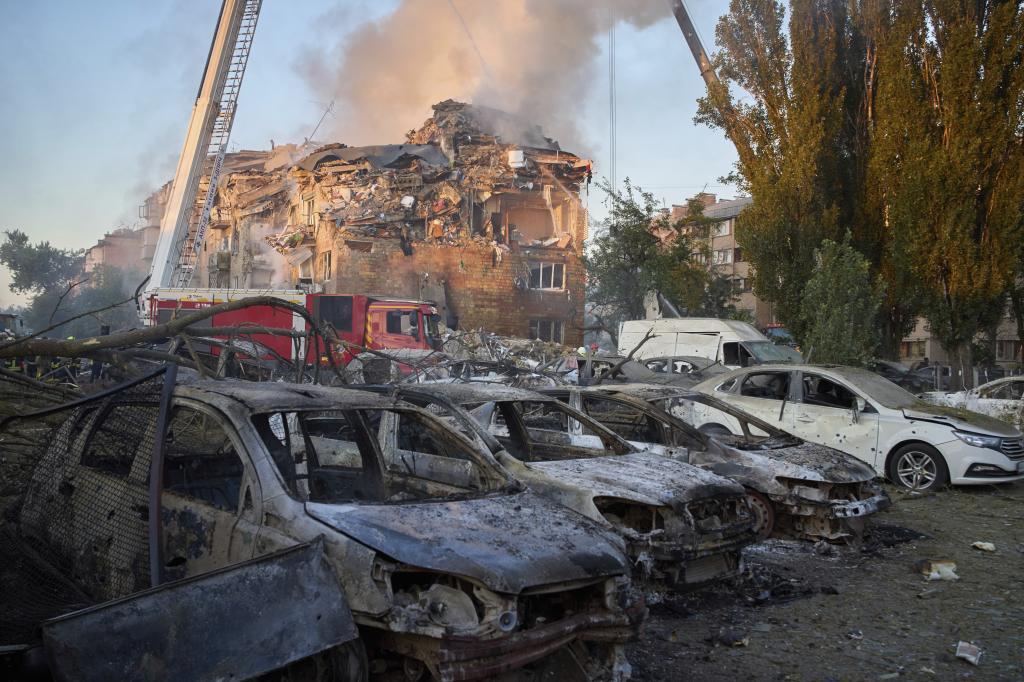The Russian army failed to hit any military targets in the city of Kiev, but did achieve its objectives: administering another poisonous dose of terror on the civilian population. The casualties are increasing. Vladimir Putin, who personally directs the war, launched a bloody blitz on the capital of Ukraine and some of its cities. When the smoke from the missiles cleared, rescue services counted 14 dead, including three children, and dozens injured.
A total of 563 Shahed drones, an X-47 cruise missile, seven Iskander and KN23 ballistic missiles from North Korea, and 18 X-101 projectiles flew over the skies of Ukraine from Russian territory. Although many were shot down in flight, 629 aerial targets are too many for any anti-aircraft system, a saturation strategy of defenses that unfortunately makes sense. Moscow is now producing 500 Shahed drones every 24 hours. The goal is to produce 1,000 by the end of the year, making the attacks increasingly deadly. It is a deadly cheap weapon (20,000 euros) but lethal, emitting a motor sound heard throughout the city and instilling terror in people trying to sleep.
"Russia prefers ballistic missiles over negotiation tables. It chooses to keep killing instead of ending the war. It is definitely time to impose new and tough sanctions against Russia for everything it is doing," declared Ukrainian President Volodymyr Zelensky. Kiev's mayor, former world boxing champion Vitali Klitschko, stated that there are about 50 wounded, with 40 hospitalized. The attacks have damaged residential buildings in several districts of the capital, as well as a shopping center, a nursery, and the offices of the Ukrainska Pravda newspaper.
The attack was also aimed "deliberately" at the European Union delegation in Kiev, as denounced by the President of the European Council, António Costa, who declared himself "horrified" by the new wave of attacks and stated that "the EU will not be intimidated. Russian aggression only strengthens our resolve to stand by Ukraine and its people." The EU building was destroyed by a missile impact. Russia has many missiles from the Soviet era with very low precision, but this is not the case with the Iskander. If it hit that diplomatic building, it was the Kremlin's target.
Other missiles hit residential buildings, something that happens daily. Is it really efficient for Russia to use million-dollar missiles to attack targets with no strategic value? It must be under their punishment mentality, as they have been practicing since the beginning of the invasion. The Ukrainian tactic, which has focused on Russia's war economy, destroying refineries and weapons factories, but Russia has targeted the people.
Faced with the failure of Vladimir Putin on the front lines, where the summer offensive has once again failed to achieve its minimum objectives (Pokrovsk, Kupiansk, Konstiantinivka...), revenge from a distance always follows. It is a pattern that has been repeating since the early days of the invasion. Now, with a U.S. president more interested in his relationship with the Kremlin than the fate of Ukrainians.
Vladimir Putin, the man who supposedly wants peace according to U.S. President Donald Trump, continues to show tangible evidence to the contrary. In Ukraine, no one trusted him, and now neither does Trump, engaged in negotiations he rejects every week, making him less credible. The Kremlin has Trump, who seems captivated by the Russian autocrat, exactly where he wants him, boasting of a close relationship on every occasion. This was evident on the red carpet in Alaska, where Trump welcomed Putin with applause. It is precisely the support Putin needs to spread his blood-stained carpet over Ukrainian cities.
Putin feels emboldened with an appeasing Trump, but also with an ineffective Europe whose building in Kiev has been blown up. All efforts of its leaders seem to work for a few days, when Donald Trump threatens Russia with sanctions. But as soon as he speaks with the Russian over the red phone, they return to the eternal two-week ultimatum that is never fulfilled. We have had seven since February without the Kremlin facing any consequences in the form of sanctions or tariffs, something all its old allies have suffered. Yesterday, Emmanuel Macron (France), Friedrich Merz (Germany), and Donald Tusk (Poland) delivered speeches in Moldova about freedom and their commitment to nations attacked by Russia.
